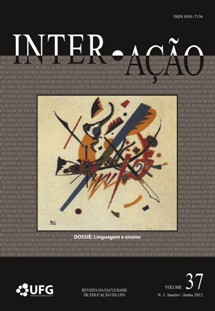A DOMESTICAÇÃO DOS AGENTES EDUCATIVOS: HÁ ALGUMA LUZ NO FIM DO TÚNEL
DOI :
https://doi.org/10.5216/ia.v37i1.18867Résumé
Neste estudo retoma-se a questão da relação triádica constitutiva do ofício: alunos, professor e conhecimento, verificando como ao longo da história esta relação definiu diferentes “identidades” para o professor. Sobretudo nas últimas décadas, as políticas públicas de currículo nacional, avaliações nacionais e programa de aquisição de livros didáticos, ou mesmo de pacotes pedagógicos, produziram uma domesticação dos agentes educativos que passaram a nortear seu ensino pelas exigências postas pelo sistema como um todo, com perda quase total de autonomia. A luz no fim do túnel vem precisamente dos espaços políticos que iluminaram esta mesma domesticação: o modelo norte-americano que, tendo fracassado, volta-se para a construção de uma maior autonomia nos processos didáticos e pedagógicos. A exemplificação deste processo se faz com base no ensino da linguagem.Téléchargements
Téléchargements
Publié-e
Comment citer
Numéro
Rubrique
Licence
A Inter-Ação utiliza como base para transferência de direitos a licença Creative Commons Attribution 4.0 para periódicos de acesso aberto (Open Archives Iniciative - OAI). Por acesso aberto entende-se a disponibilização gratuita na Internet, para que os usuários possam ler, baixar, copiar, distribuir, imprimir, pesquisar ou referenciar o texto integral dos documentos, processá-los para indexação, utilizá-los como dados de entrada de programas para softwares, ou usá-los para qualquer outro propósito legal, sem barreira financeira, legal ou técnica.
Autores que publicam neste periódico concordam com os seguintes termos:
1) Autores mantém os direitos autorais e concedem à revista o direito de primeira publicação, com o trabalho simultaneamente licenciado sob a Licença Creative Commons Attribution que permite o compartilhamento do trabalho com reconhecimento da autoria e publicação inicial nesta revista.
2) Autores têm autorização para assumir contratos adicionais separadamente, para distribuição não-exclusiva da versão do trabalho publicada nesta revista (ex.: publicar em repositório institucional ou como capítulo de livro), com reconhecimento de autoria e publicação inicial nesta revista.
3) Autores têm permissão e são estimulados a publicar e distribuir seu trabalho online (ex.: em repositórios institucionais ou na sua página pessoal) a qualquer ponto antes ou durante o processo editorial, já que isso pode gerar alterações produtivas, bem como aumentar o impacto e a citação do trabalho publicado.















